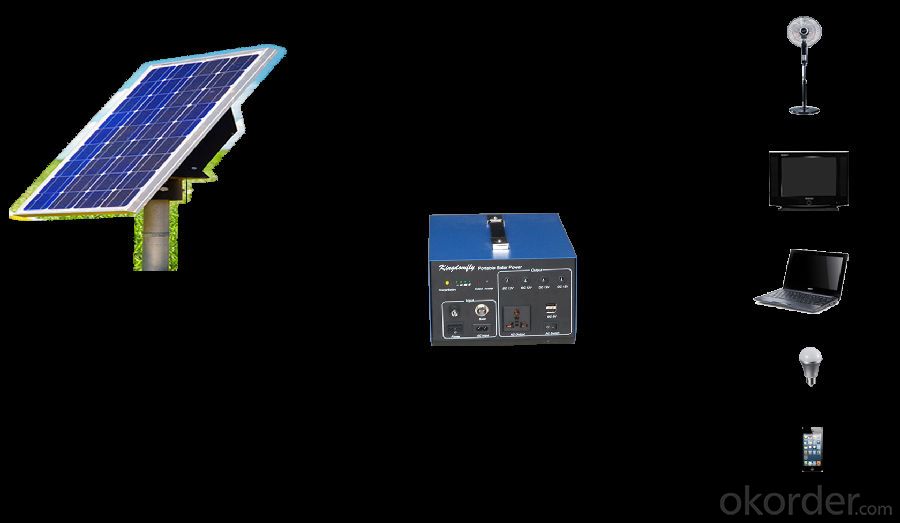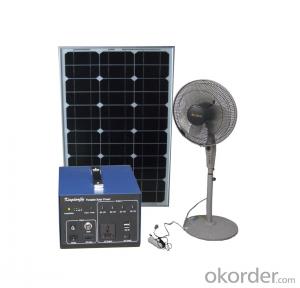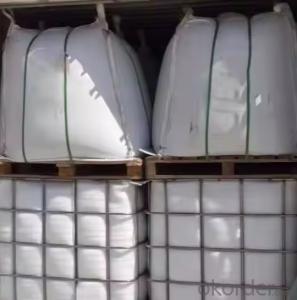Portable Solar Lighting System Hot Selling SPS_50W
- Loading Port:
- China main port
- Payment Terms:
- TT OR LC
- Min Order Qty:
- 3 pc
- Supply Capability:
- 10000 pc/month
OKorder Service Pledge
OKorder Financial Service
You Might Also Like
Main Information
SPS_50W This product is high performance,family used portable solar power system,which can receive energy and store it in battery outside connected to SPK by solar energy on sunny day,and supplies electric power for varies appliances such as electric fan,lighting lamps, television, portable computer etc.It can supply power for both DC and AC electric application .It’s very helpful and useful for home electric supply.

Features
◆ Both Solar charge input and AC charge input.
◆ Both DC and AC output
◆ Solar Feedback Circuit Protection
◆ Output Short-circuit Protection
◆ Solar「+」「-」anti-access protection
◆ Output「+」「-」anti-access protection
◆ Over Charged Protection
◆ Over Discharged Protection
◆ Over Load Protection
◆ Over-Temperature Protection
Technical parameters
Specification | Value/Material | |
Item No. KDF | SPS_50W | |
Solar Recommended | Specification | Poly silicon |
Working Voltage/Power | 18V45~60WP | |
Battery | Rated Voltage/Capacity | 12V26AH |
Cycle Number | 80% Deep Cycle Number:500 70% Cycle Number:800 | |
Working Temperature | Short Period(one Month):-20~50℃ Long Period(Six Months):-10~45℃ | |
Charging Controller | Operating Voltage | 12V |
Input Voltage | 17.3V~21V | |
Input current | MAX:10A | |
Power Consumption | MAX: 5mA | |
Low Voltage Disconnect(LVD) | 10.8V | |
Low Voltage Reconnect(LVR) | 12.3V | |
High Voltage Discharge( HVC) | 14.6V | |
High Voltage Recharge(HVR) | 13.8V | |
Temperature Protection | 60℃ | |
DC Output | DC output & Application | USB 5V1A*2 |
DC output & Application | DC 12V1*4A | |
AC Output | Output Wave | Modified Wave |
Input Voltage | 11V~15V | |
Output Voltage | 110V±10% | |
Output Frequency | 60Hz±2Hz/50Hz±2Hz | |
Rated Output Power | 200W | |
Maximum VA | 400VA | |
Maximum Efficiency | 88% | |
Temperature | 0-40℃ | |
Over Temperature | 60℃~70℃ | |
Low Voltage Alarm | 11V | |
Low Voltage Shut off | 10.5V | |
High Voltage Shut off | 16V | |
Package | Set size | 328*252*267mm |
Set N·W | 11.6kg | |
Set N·W | 12.8kg | |
- Q:Can solar energy systems be used in areas with saltwater exposure?
- Yes, solar energy systems can be used in areas with saltwater exposure. However, the components of the system need to be specially designed and built to withstand the corrosive effects of saltwater. This includes using materials that are resistant to corrosion and taking appropriate measures for maintenance and protection against saltwater damage.
- Q:Can solar energy systems be used in areas with limited access to solar energy installation services?
- Yes, solar energy systems can still be used in areas with limited access to solar energy installation services. In such areas, individuals or communities can opt for portable or off-grid solar energy systems that can be easily installed and maintained without the need for extensive professional services. These systems can provide a reliable source of renewable energy for various applications, such as powering small appliances, lighting, or even charging devices. Additionally, advancements in technology and the availability of DIY solar kits have made it possible for people to install and maintain solar energy systems themselves, further expanding access to solar energy in remote or underserved areas.
- Q:Can solar energy systems be used in areas with high electrical demand?
- Yes, solar energy systems can be used in areas with high electrical demand. With advancements in technology, solar energy systems have become more efficient and can now generate a significant amount of electricity. Additionally, solar energy systems can be combined with energy storage solutions to ensure a continuous power supply, even during periods of high demand. This makes solar energy a viable option for meeting the electrical needs of areas with high energy requirements.
- Q:What is the role of microinverters in solar energy systems?
- Microinverters play a crucial role in solar energy systems as they convert the direct current (DC) generated by each individual solar panel into alternating current (AC) that can be used to power appliances and be connected to the electrical grid. By allowing each panel to operate independently, microinverters optimize the overall performance of the system, increase energy production, and provide greater flexibility in system design and monitoring.
- Q:Are there any tax benefits for installing a solar energy system?
- Installing a solar energy system comes with numerous tax benefits. One significant benefit is the federal investment tax credit (ITC), which permits individuals and businesses to deduct a percentage of their solar energy system's cost from their federal taxes. As of 2021, the ITC offers a 26% tax credit for residential and commercial systems. Moreover, some states provide their own tax incentives for solar energy installations. These incentives may encompass exemptions from property taxes, sales taxes, or state tax credits. The availability and extent of these incentives differ from state to state, necessitating thorough research into the specific incentives offered in your region. Furthermore, the installation of a solar energy system can enhance your property's value. Numerous studies have demonstrated that homes equipped with solar panels yield a higher selling price compared to those without. This boost in property value can yield long-term financial advantages. To fully comprehend and capitalize on all the tax benefits associated with installing a solar energy system, it is advisable to consult a tax professional or a solar energy expert.
- Q:What is the impact of lightning on solar panels?
- Solar panels are susceptible to significant damage from lightning strikes. The panels themselves can be immediately harmed, resulting in malfunctions or complete destruction. Lightning generates intense heat that can melt or vaporize the materials used in the panels, causing irreparable harm. Additionally, lightning strikes can cause electrical surges that travel through the solar panel system, damaging connected equipment like inverters, charge controllers, or batteries. These power surges overload and destroy the delicate electrical components within the system. To reduce the impact of lightning, surge protectors or lightning arrestors are often included in solar panel installations. These protective measures redirect high-voltage electrical currents away from the panels and other sensitive equipment, minimizing the risk of damage. Despite these precautions, lightning strikes can still pose a threat to solar panels. Therefore, it is wise to have comprehensive insurance coverage that includes protection against lightning damage. Regular maintenance and inspections of the solar panel system can also identify any issues caused by lightning strikes and allow for timely repairs. In conclusion, lightning can have a detrimental impact on solar panels, causing immediate damage and potential long-term consequences for the entire system. Taking precautionary measures, having proper insurance coverage, and monitoring the system's condition are crucial for minimizing risks and ensuring the longevity of solar panel installations.
- Q:Can solar energy systems power an entire home or business?
- Yes, solar energy systems have the potential to power an entire home or business. The size and efficiency of the system, as well as the energy requirements of the property, play a crucial role in determining if it can meet all the energy needs. With the right design and installation, solar energy systems can provide enough electricity for the entire building, while also reducing reliance on traditional energy sources and lowering carbon emissions.
- Q:What is the difference between a solar energy system and a solar thermal system?
- Solar energy systems and solar thermal systems both harness energy from the sun, but they differ in their methods of conversion and utilization. A solar energy system, which is also known as a photovoltaic (PV) system, utilizes solar panels composed of photovoltaic cells to directly convert sunlight into electricity. These panels contain semiconductor materials that generate an electric current when exposed to sunlight. The electricity produced by the PV system can be used to power various electrical devices, including lights, appliances, and even entire houses or buildings. It can also be stored in batteries for future use or fed back into the grid. On the other hand, a solar thermal system primarily focuses on utilizing the sun's energy to heat water or air. This system typically consists of solar collectors that absorb sunlight and convert it into heat energy. The accumulated heat is then transferred to a fluid, usually water or anti-freeze, that circulates throughout the system. In a water-based solar thermal system, the heated fluid can be directly used for domestic hot water or space heating purposes. In contrast, an air-based solar thermal system uses the heated air to warm indoor spaces. To summarize, the primary distinction between a solar energy system and a solar thermal system lies in their methods of converting and utilizing solar energy. A solar energy system directly converts sunlight into electricity, while a solar thermal system converts sunlight into heat energy for heating water or air.
- Q:How much space is required to install a solar energy system?
- The amount of space required to install a solar energy system depends on various factors such as the size and capacity of the system, the location, and the available sunlight. Generally, a small residential solar energy system may require around 100-400 square feet of roof space, while larger systems for commercial or industrial use could require several thousand square feet or even acres of land. It is recommended to consult with a solar energy professional to determine the specific space requirements for a particular system.
- Q:Can a solar energy system be installed on a carport or parking lot?
- Yes, a solar energy system can be installed on a carport or parking lot. In fact, carports and parking lots are ideal locations for solar panel installations as they provide ample space and can generate clean energy while also providing shade and protection for vehicles. This also allows for dual use of the space, making it a cost-effective and sustainable solution for generating renewable energy.
1. Manufacturer Overview |
|
|---|---|
| Location | |
| Year Established | |
| Annual Output Value | |
| Main Markets | |
| Company Certifications | |
2. Manufacturer Certificates |
|
|---|---|
| a) Certification Name | |
| Range | |
| Reference | |
| Validity Period | |
3. Manufacturer Capability |
|
|---|---|
| a)Trade Capacity | |
| Nearest Port | |
| Export Percentage | |
| No.of Employees in Trade Department | |
| Language Spoken: | |
| b)Factory Information | |
| Factory Size: | |
| No. of Production Lines | |
| Contract Manufacturing | |
| Product Price Range | |
Send your message to us
Portable Solar Lighting System Hot Selling SPS_50W
- Loading Port:
- China main port
- Payment Terms:
- TT OR LC
- Min Order Qty:
- 3 pc
- Supply Capability:
- 10000 pc/month
OKorder Service Pledge
OKorder Financial Service
Similar products
New products
Hot products
Related keywords





























